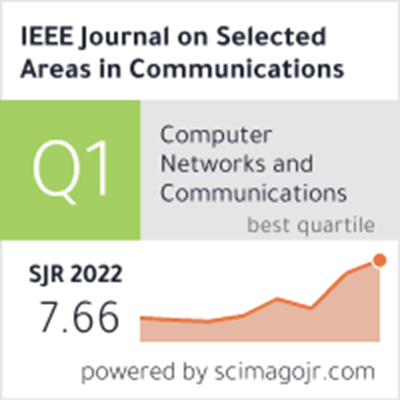异构超密集网络中流量分流与资源分配的契约设计
IF 13.8
1区 计算机科学
Q1 ENGINEERING, ELECTRICAL & ELECTRONIC
IEEE Journal on Selected Areas in Communications
Pub Date : 2017-10-06
DOI:10.1109/JSAC.2017.2760459
引用次数: 101
摘要
在异构超密集网络(HetUDN)中,软件定义的无线网络(SDWN)将资源管理与属于不同服务提供商的地理分布资源分离。集中式SDWN控制器可以全局管理整个网络。在本文中,我们重点研究了基于SDWN的HetUDN中的移动业务卸载和资源分配,该网络由不同的宏基站和小小区基站(SBS)组成。我们探索了一种场景,其中SBS的容量是可用的,但SDWN控制器不知道它们的卸载性能:这是信息不对称的情况。为了解决这种不对称性,设计了激励流量卸载合同,以鼓励每个SBS选择实现其自身最大效用的合同。HetUDN中大量SBS的特征汇总在一个分析模型中,使我们能够根据不同的合同选择提供卸载的SBS类型,这些合同为不同的SBS类型提供了合理性和激励兼容性。这导致了用于选择所涉及的SBS类型的闭式表达式,并且我们证明了所产生的契约的单调性和激励相容性。通过仿真验证了所提出的基于合同的流量卸载机制的有效性和效率,以及其整体系统性能。本文章由计算机程序翻译,如有差异,请以英文原文为准。
Contract Design for Traffic Offloading and Resource Allocation in Heterogeneous Ultra-Dense Networks
In heterogeneous ultra-dense networks (HetUDNs), the software-defined wireless network (SDWN) separates resource management from geo-distributed resources belonging to different service providers. A centralized SDWN controller can manage the entire network globally. In this paper, we focus on mobile traffic offloading and resource allocation in SDWN-based HetUDNs, constituted of different macro base stations and small-cell base stations (SBSs). We explore a scenario where SBSs’ capacities are available, but their offloading performance is unknown to the SDWN controller: this is the information asymmetric case. To address this asymmetry, incentivized traffic offloading contracts are designed to encourage each SBS to select the contract that achieves its own maximum utility. The characteristics of large numbers of SBSs in HetUDNs are aggregated in an analytical model, allowing us to select the SBS types that provide the off-loading, based on different contracts which offer rationality and incentive compatibility to different SBS types. This leads to a closed-form expression for selecting the SBS types involved, and we prove the monotonicity and incentive compatibility of the resulting contracts. The effectiveness and efficiency of the proposed contract-based traffic offloading mechanism, and its overall system performance, are validated using simulations.
求助全文
通过发布文献求助,成功后即可免费获取论文全文。
去求助
来源期刊
CiteScore
30.00
自引率
4.30%
发文量
234
审稿时长
6 months
期刊介绍:
The IEEE Journal on Selected Areas in Communications (JSAC) is a prestigious journal that covers various topics related to Computer Networks and Communications (Q1) as well as Electrical and Electronic Engineering (Q1). Each issue of JSAC is dedicated to a specific technical topic, providing readers with an up-to-date collection of papers in that area. The journal is highly regarded within the research community and serves as a valuable reference.
The topics covered by JSAC issues span the entire field of communications and networking, with recent issue themes including Network Coding for Wireless Communication Networks, Wireless and Pervasive Communications for Healthcare, Network Infrastructure Configuration, Broadband Access Networks: Architectures and Protocols, Body Area Networking: Technology and Applications, Underwater Wireless Communication Networks, Game Theory in Communication Systems, and Exploiting Limited Feedback in Tomorrow’s Communication Networks.

 求助内容:
求助内容: 应助结果提醒方式:
应助结果提醒方式:


